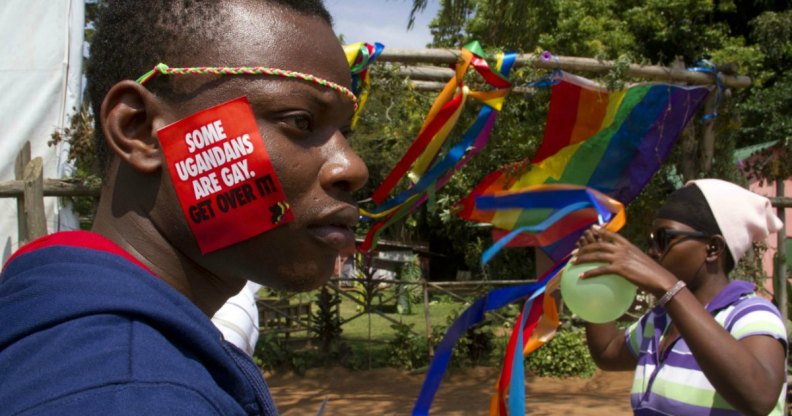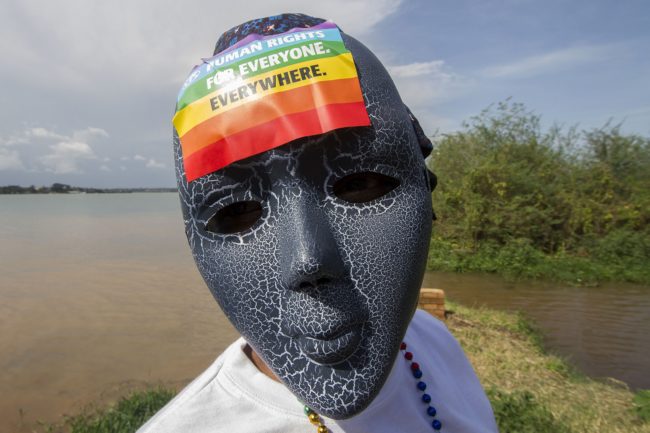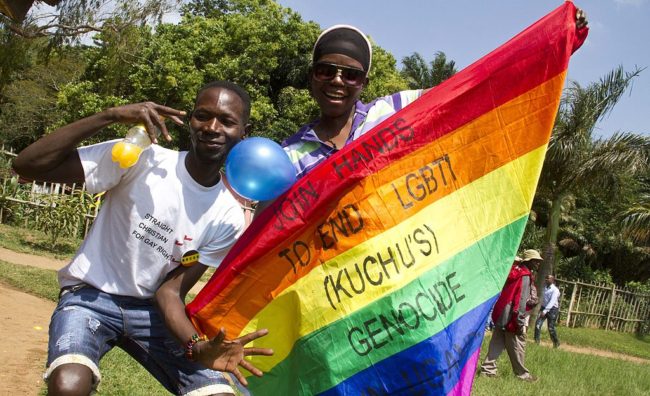Ugandan LGBTQ+ activists announce plans for Pride following crackdown

LGBTQ+ activists in Uganda have announced plans to run a Pride event this year after a violent crackdown in 2016 which saw police raids and arrests at the event.
Ahead of the 2016 Pride, government officials warned that they would arrest anyone that took part.
Simon Lokodo, the Minister of State for ‘Ethics & Integrity’, likened LGBTQ+ people to paedophiles in the statement in which he warned people would be apprehended.
He said: “We are aware that there are inducements, including money, being offered to young people to promote the practice.
“We wish to emphasise that whereas the promotion of homosexuality is criminalised under the Penal Code, there is no violence against the LGBT community in Uganda – contrary to some claims made loosely by proponents of this movement.”
Despite emphasising the lack of violence, organisers of the Pride officially cancelled it out of fear of physical harm.

Entebbe, Uganda. 2015 (ISAAC KASAMANI/AFP/Getty Images)
Related: Uganda fails to target gay men and sex workers in HIV initiative
“It is with very heavy hearts and deep-felt sadness that we announce the cancellation of Pride Uganda 2017.
“Following the Police raid and interruption of the Pride parade last year, extra precaution was taken in organising this year’s festival,” the statement read.
Despite the last Pride being “officially” cancelled, many Pride-goers still went to the event but they were broken up by police and some were arrested, including organiser and executive director of Sexual Minorities Uganda (SMUG), Frank Mugisha.
Any hope for a Pride event in 2017 was completely dashed after Lokodo promised “arrest, even violence”.
Living conditions for LGBTQ+ people are reportedly getting slightly better in the country, with activists reporting fewer people being “arrested, put in police cells and tortured”.
Activist Isaac Mugisha, from Uganda, told The Daily Beast that he and other LGBTQ+ activists were now trying to work with straight allies to ensure Pride events could go ahead without being raided.
“The momentum is now so different to 2015. Then just a handful of LGBTS gathered. Now we are looking at hundreds of people wanting to gather for a Pride event,” Isaac Mugisha said.

Ugandan men hold a rainbow flag reading “Join hands to end LGBTI genocide” at Ugandan Pride 2014 (ISAAC KASAMANI/AFP/Getty Images)
Frank Mugisha (who is not related to Isaac) added that “things are not looking so bad so far.
“Learning from last year our idea is to start planning early for Pride 2018.
“Our visibility is still very important to us, and we are hoping to have Pride this year, and a much bigger event,” he said.
However, he explained that it is still a very real fear that a Pride event could be raided by police.
“Even with the efforts to sensitize states’ institutions and lawmakers there is still so much discrimination and violations of LGBT persons going on here,” he said.
Some LGBTQ+ activists argue that the country is no safer than two years ago.

Adrian Jjuuko, executive director of Human Rights and Awareness and Promotion Forum (HRAPF), said: “From my perspective, I do not think any progress has been made, particularly in LGBT organizing. To the contrary, the situation seems to be worsening since 2016.”
Ugandan President Museveni signed the draconian Anti-Homosexuality Bill in February 2014. The law called for repeat offenders to be sentenced to 14 years in prison and to make it a criminal offence not to report someone for being gay.
However, the country’s Constitutional Court later struck down the bill, finding that the speaker of parliament acted illegally by moving ahead with a vote on the law despite at least three lawmakers objecting to a lack of quorum.
Despite this, it still remains illegal to be gay in Uganda.
Uganda later passed a controversial new law, that could result in the closure of NGOs helping the country’s LGBT population.
The country’s parliament passed the controversial Non-Governmental Organisations (NGO) bill, in a late-night sitting.
Museveni has previously claimed that Uganda is a “better destination” for tourists than Spain, that “Uganda is so rich, we should be the ones to give aid”, and that oral sex is a Western invention that is “more terrible” than homosexuality.
This year an LGBT+ rights organisations shared photographs of men who broke into its offices and killed a security guard.
Human Rights Awareness and Promotion Forum Uganda (HRAPF) was broken into in May and a security guard was killed as its offices were ransacked.

